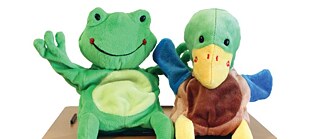German for children in England
Learn German with Felix and Franzi

Foreign languages were not compulsory at primary schools in England. That changed in September 2014. To mark the occasion and to boost German at primary level, the Goethe-Institut London developed materials for 8-10 year-olds: English-speaking children can now have fun learning German with hand puppets Felix and Franzi.
In Britain it is not taken for granted that primary school teachers speak the language they teach fluently. More professional development opportunities and materials of current interest are needed so that even teachers with minimal German skills can teach the language. They must be student-oriented in design and structured in such a way that adults can learn alongside the children.
The materials from the Goethe-Institut London focus on two hand puppets – Felix the frog and Franzi the duck. The frog and the duck come from Berlin Zoo to England. They find an old German letterbox in an antique shop. They move in because it reminds them of their home. That’s the starting point. Each lesson unit has its own little story so that vocabulary is always learnt in context. For example in Chapter Two Felix feels homesick. This situation is used for the question “Wie geht es dir?” (How are you?).
Teachers will find detailed instructions on how they can structure each lesson in the materials. This allows for between 30 and 60 minutes per week of teaching time. Felix and Franzi the hand puppets help them to tell stories in German and thus facilitate learning progress. The materials are written in English and are available to download free of charge. Songs, additional information, animated film clips and whiteboard apps round off the portfolio.
Video: Felix and Franzi make fruit salad (Volume 1, Chapter 5) © Goethe-Institut
Download
The materials have so far been developed to cover two years and a further two years’ worth of material is planned.
A good idea to start off
“Hallo, ich bin Felix. Hallo, ich bin Franzi. Ich – dich – sich – mich: Strange words. But they rhyme. Can you try to say these words? When you take the English word ‘rich’ and pronounce it like a German word, what would it sound like? RICHTIG!” Deutsch ist simple – it seems. What did the frog from the letterbox say: Ich bin Felix? What can you say to him as a reply?”
You might use words like these for your introduction. At the start the children know only very few German words. But it’s easy to use first names and a game for pronunciation practice. The teacher asks Felix frog about his friends. Felix lists the names Mia, Sophie, Alexander, Florian, Heinrich, Antonia etc. They are shown how to write them. The children repeat them to familiarise themselves with German pronunciation, particularly of vowels. Then the teacher explains that Felix likes to play games. Felix is given a sticker on his back with a new name. Now he asks: Bin ich Alexander, Hanna, …?” The children learn to answer with “Ja” or “Nein”. Then they are given new names on their backs too. They ask questions to find out who they are. In German of course.
The first reading passage
“Das ist Felix. Felix ist ein Frosch. Und das ist sein Haus. Felix ist im Haus. Er kann singen. Das ist Franzi. Franzi ist eine Ente. Felix und Franzi sind Freunde.” (This is Felix. Felix is a frog. And this is his house. Felix is in the house. He can sing. This is Franzi. Franzi is a duck. Felix and Franzi are friends.)
A short text like this can be introduced as early as the third or fourth German lesson. First the children listen to the text, then they read along with the second listening. Finally they can work out its content, since it contains many words that are similar to English ones. Next the teacher lets the children read the text several times before hiding it and saying a single word. The children should try to say the whole sentence from which the word was taken. Before the next word is given for guessing, the whole text can be shown again for them to read.
The first writing
A dictogloss (as used by Henseler et al.) is a good opportunity for a first writing exercise in sentences. The children read a sentence each. Then more and more of the text is hidden, but they still carry on reading. The children learn it by heart without realising. When the text has become almost recognisable, they are given the task of working in pairs to write it out as close as possible to the original. This alternative to a dictation is extremely effective and children prefer to work as a team.
 Example of a dictogloss | © Roma Franziska Schultz
Example of a dictogloss | © Roma Franziska Schultz
The first book
It is a particular challenge for children to read their first book in German. To ensure a successful start, the Goethe-Institut London has developed an e-book that complements the Felix and Franzi material. Once the children have learnt the German alphabet, they can listen to, understand and read the book “Die kleine graue Maus” (The little grey mouse) themselves. The e-book can be found on the Institute’s Youtube channel.
E-book “Die kleine graue Maus” © Goethe-Institut
If you have any questions on the material please contact the Goethe-Institut London. Have fun with Felix and Franzi!
Literatur
Henseler, Roswitha; Möller, Stefan; Grieser-Kindel, Christin: Method Guide: Methoden für einen kooperativen und individualisierenden Englischunterricht in den Klassen 5 - 12. Schöningh Verlag im Westermann Schulbuch: 2009.